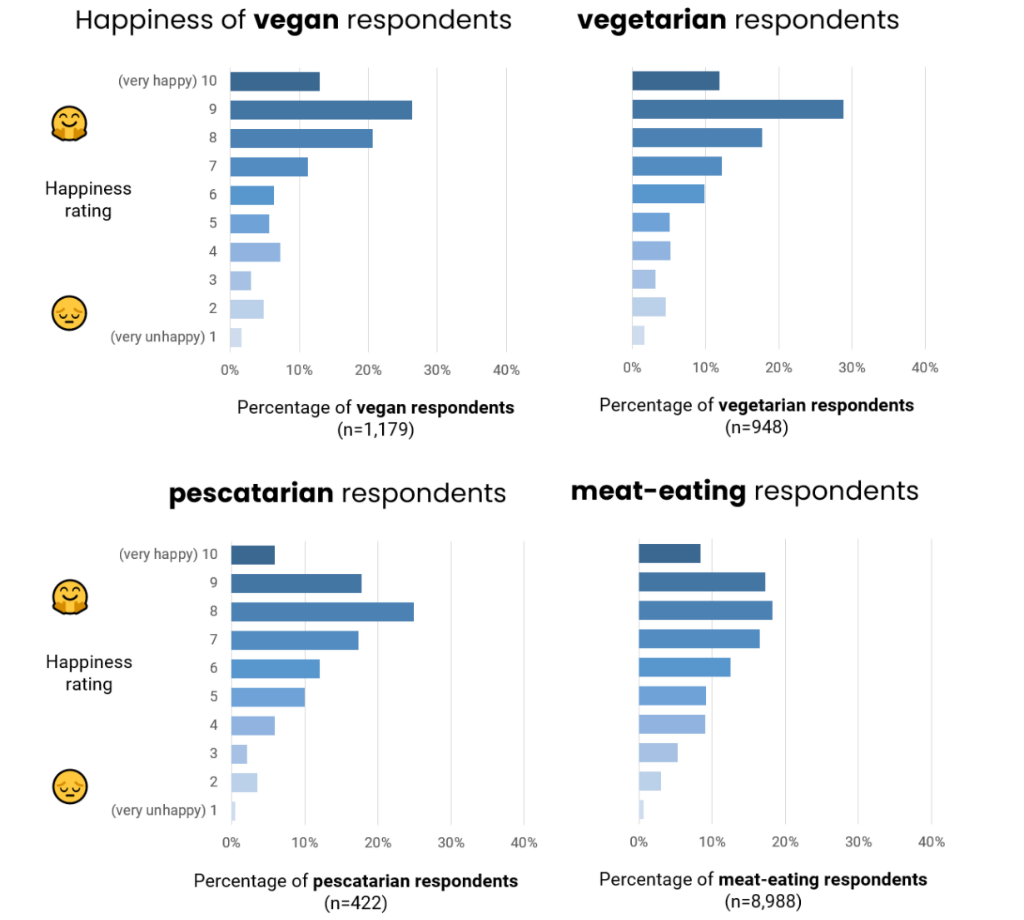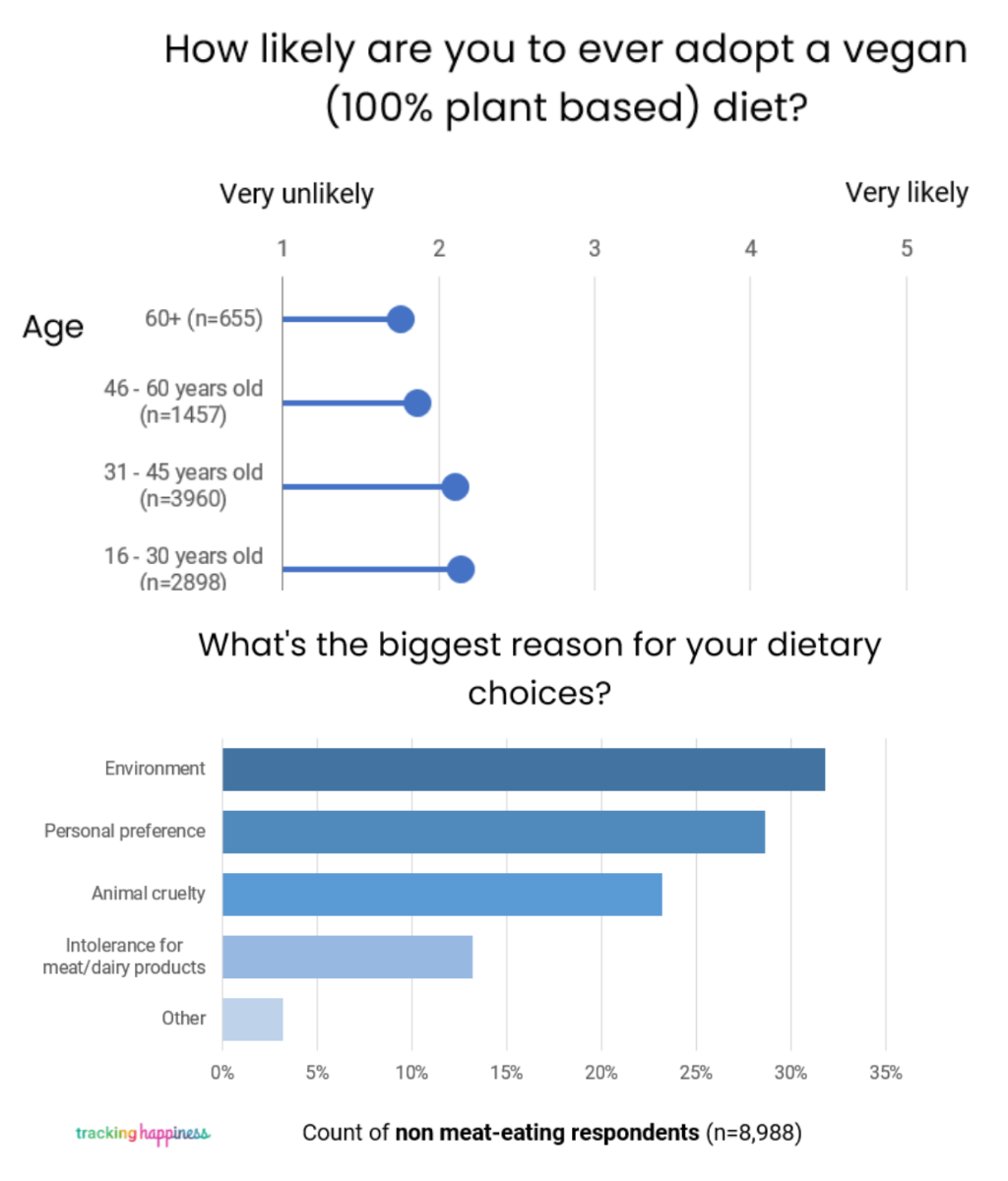5 Mins Read
A new study was looking to do a deeper dive into the many misconceptions about vegans and vegetarians has taken meat eaters by surprise, with the results showing that vegans reported higher happiness levels (+7%) than those who consume meat. Further data revealed that meat eaters who were happier were even more likely to turn vegan in the future than those who weren’t.
Conducted by Tracking Happiness, the study surveyed 11,537 self-identified respondents from the United States, which included 179 vegans, 948 vegetarians, 422 pescatarians (those who follow a vegetarian diet and consume seafood) and 8,988 meat-eaters respectively.
When asked to look back at the last year of their life and rate their happiness on a scale from 1 to 10, the study showed that the average happiness rating among the respondents was 6.90, with meat-eaters scoring the lowest average happiness rating at 6.80, and vegans scored an average of 7.27.
In addition to this, the data found that out of the 8,988 meat-eaters surveyed, those who were happier were more likely to switch to a 100% plant-based diet in the future. For instance, people who reported their happiness with a 7 scored an average likelihood of turning vegan of 2.03 with the study suggesting that perhaps vegans are happier because those who switch to planet-friendly diets are already in a better state of mind before they switch and it’s likely that someone that is less happy would not be that ready to ditch animal-based products.

In the study results seen by Green Queen, vice president of international programs of PETA, Mimi Bekhechi said: “It’s no wonder vegans are happier – by sparing animals atrocious suffering, helping to save the planet, and improving their own health, vegans can enjoy peace of mind and a clean conscience. If you want to join the happy v-gang, you’re in luck: going vegan has never been easier or tastier.”
The study further analyzed the opinions meat-eating respondents have about veganism and those that are vegans with the average meat-eater in the survey thinking positively about vegans reporting a 3.44 on a scale from 1 to 5.
It’s no wonder vegans are happier – by sparing animals atrocious suffering, helping to save the planet, and improving their own health, vegans can enjoy peace of mind and a clean conscience
Mimi Bekhechi, vice president of international programs of PETA
When asked how likely were they to adopt this diet, just 16% of meat-eaters said they would adopt a 100% plant-based diet with the average meat-eater considering the likelihood of embracing a vegan diet to be 2.05.
Read: Meat Eaters ‘Wilfully Disregard Factory Farming’ As Driver Of Infectious Diseases, Study Finds
Tracking Happiness founder Hugo Huijer said that the team believes that happiness and sustainability go hand in hand. “Sustainable behaviour is linked to increased mental health, which is why it’s so important to talk about the consumption of animal products. Even though the positive environmental effect of veganism cannot be disputed, there is still a negative stigma surrounding people who claim to be vegan.”
The data analyzed the likelihood of those surveyed to adopt a plant-based diet and showed that this is inversely correlated with a person’s age: those aged 60+ had a rating of 1.76, whereas the 16-30 year-old group came in at 2.14, highlighting that older people are significantly less likely to switch to a vegan diet.
The survey further found that those already in the process of limiting their consumption of animal products are 220% more likely to adopt a 100% plant-based diet.
Sustainable behavior is linked to increased mental health, which is why it’s so important to talk about the consumption of animal products
Hugo Huijer, founder of Tracking Happiness
Huijer added: “One of our readers even emailed us recently that he feels such a nuisance whenever he has to notify someone else of his vegan diet. We landed on this study subject when we found that data on vegan stigmas and happiness is either lacking or outdated. And since it’s clear that people generally only change their opinions when faced with new data and facts, we want to provide a meaningful source of information that could stimulate this change. We sincerely hope that our findings help people make informed decisions regarding sustainability, happiness and the consumption of animal products.”
In addition, the survey asked the respondents what were their reasons for their plant-based dietary choices with the topmost reason (32%) being to reduce their impacts on the environment and the third being due to the animal cruelty that goes down in the animal agriculture industry.

Those who chose to counter animal cruelty by switching to plant-based diets were found to be least happy when compared to those who gave other motives while those that chose the environment for their switch were found to be the happiest with an average happiness rating of 7.72.
The spokesperson for the Vegan Society, Francine Jordan said that they aren;t at all surprised by these findings. “We know that the image of veganism is undergoing the most radical change in its history, while shedding some tired, old stereotypes. It’s no longer portrayed as an unusual lifestyle, it’s easy and accessible – you can walk into any supermarket and be greeted by a huge range of plant-based products or walk into any restaurant and be presented with an exciting vegan menu. There has never been a better time to be vegan and it’s great to see that vegans are much happier too!”
The study concluded by highlighting the the world is slowly accepting vegans and the concept of veganism and young people will be majorly driving this plant-based movement given that they are more likely to embrace plant-based diets.
According to another report, while the number of vegans and vegetarians are increasing, flexitarians (those that are slowly reducing their meat consumption) that constitute 42% of the market are driving the global plant-based movement.
Another survey highlighted that out of the 8,500 vegans surveyed from across 104 countries, 9 in 10 (89%) said that animal welfare was their “key reason” for ditching animal products completely from their diet.
Lead image courtesy of Veestro.



